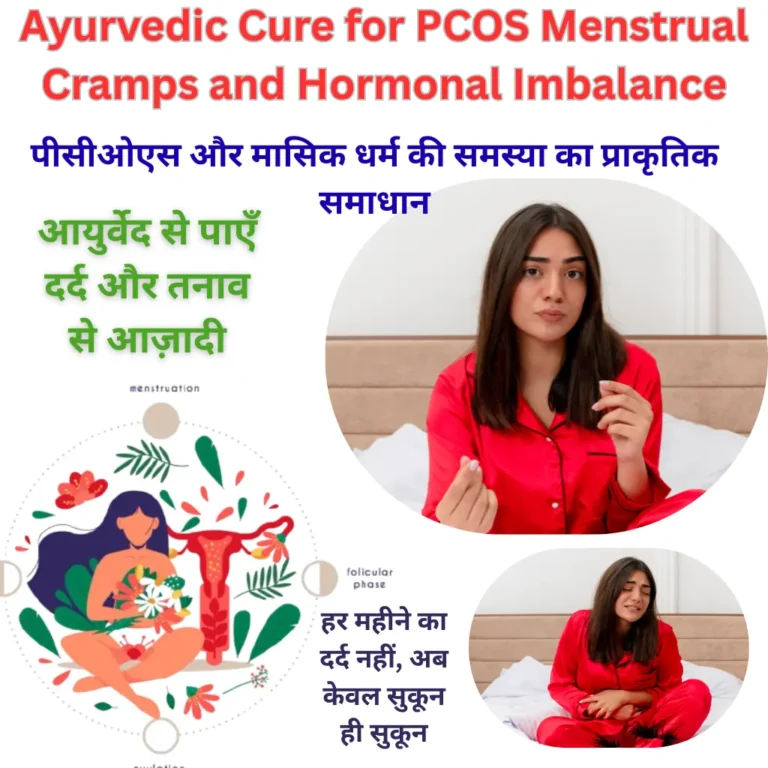Ayurvedic Cure for PCOS Menstrual Cramps and Hormonal Imbalance
Polycystic Ovary Syndrome (PCOS), painful menstrual cramps, and hormonal imbalance are among the most common health challenges faced by women today. Modern medicine often offers birth control pills or painkillers, which provide temporary relief but rarely address the root cause.
Ayurveda, a 5,000-year-old healing system, goes beyond symptom control. It works on the root imbalance of hormones and metabolism, offering a holistic cure through diet, herbs, detox therapies, and lifestyle changes.
This article presents a detailed case study-based guide, supported by clinical research, showing how Ayurveda can help women naturally manage PCOS, painful periods, and hormonal irregularities.
Understanding PCOS, Cramps & Hormonal Imbalance
What is PCOS?
Polycystic Ovary Syndrome is a hormonal disorder where ovaries produce excess male hormones (androgens). This leads to:
-
Irregular or absent periods
-
Weight gain and difficulty losing fat
-
Acne and hair growth on face/body
-
Ovarian cysts visible on ultrasound
👉 According to a study in the Journal of Clinical Endocrinology, nearly 1 in 5 Indian women suffer from PCOS.
Why Do Menstrual Cramps Happen?
Menstrual cramps occur when the uterus contracts too strongly, cutting off blood supply temporarily. In Ayurveda, this is linked to aggravated Vata dosha, which causes dryness, spasms, and sharp pain.
Hormonal Imbalance Explained
When estrogen, progesterone, and cortisol fluctuate beyond normal ranges, women experience:
-
Mood swings
-
Heavy or delayed cycles
-
Fatigue and insomnia
-
Hair fall and acne
Why Ayurveda is Different from Pills
Unlike birth control pills, Ayurveda doesn’t just suppress symptoms. It:
-
Corrects dosha imbalance (Vata, Pitta, Kapha)
-
Improves digestion and metabolism
-
Detoxifies the body (removes ama – toxins)
-
Regulates hormones naturally
Examples of Dosha Imbalance:
-
Kapha imbalance → PCOS (weight gain, cysts)
-
Vata imbalance → Painful cramps
-
Pitta imbalance → Irritability, acne, hot flashes
Ayurvedic Treatment Framework
1. Dietary Corrections (Ahara)
Food is the first medicine in Ayurveda. For
PCOS (Kapha imbalance):
-
Avoid: sugar, dairy, fried foods, processed snacks.
-
Include: quinoa, bitter greens, fenugreek, turmeric.
Menstrual Cramps (Vata imbalance):
-
Avoid: raw salads, caffeine, carbonated drinks.
-
Include: warm soups, ghee, sesame seeds, herbal teas.
Hormonal Imbalance (Pitta imbalance):
-
Avoid: spicy, oily, sour foods.
-
Include: coconut water, cucumber, coriander, aloe vera.
👉 Clinical Note: A 2016 study found fenugreek extract improved insulin sensitivity in PCOS patients, reducing symptoms significantly.
2. Detox Therapies (Shodhana)
Toxins (ama) aggravate hormone problems. Panchakarma therapies are especially useful.
-
Castor Oil Pack for Cramps: Apply warm castor oil on the abdomen for 20 min → relaxes uterus.
-
Triphala Cleanse for PCOS: 1 tsp Triphala powder at bedtime → supports liver detox and better hormone balance.
-
Basti Therapy (Medicated Enema): Helps regulate Vata, reduces cramps and constipation.
3. Ayurvedic Herbs for Women’s Health
-
Ashwagandha: Reduces cortisol (stress hormone), improves thyroid.
-
Shatavari: Balances estrogen, supports ovulation.
-
Turmeric (Curcumin): Reduces inflammation, regulates testosterone.
-
Licorice Root (Yashtimadhu): Improves estrogen-progesterone balance.
-
Dashamoola: Relieves uterine pain and spasms.
👉 A 2018 study in Ayu Journal showed Shatavari + Ashwagandha improved menstrual regularity within 6 months.
Case Studies & Clinical Research
Priya, 32 years (PCOS)
-
Symptoms: Absent periods for 6 months, weight gain, depression.
-
Treatment: Shatavari + Ashwagandha + Triphala, Kapha-reducing diet.
-
Result after 12 months: Periods became regular, lost 10 kg, improved mood.
Anjali, 28 years (Cramps + Acne)
-
Symptoms: 90-day cycles, painful cramps, cystic acne.
-
Treatment: Panchakarma detox, neem packs, ginger tea, yoga.
-
Result after 1 year: Cycles reduced to 35 days, acne cleared, cramps reduced by 70%.
Lifestyle & Yoga Practices
-
Yoga for PCOS: Bhujangasana (Cobra Pose), Supta Baddha Konasana (Reclined Butterfly).
-
Yoga for Cramps: Shavasana, Balasana (Child’s Pose), Viparita Karani (Legs up wall).
-
Dinacharya (Daily Routine):
-
6 AM: Wake up, drink warm lemon water.
-
10 PM: Sleep early for hormone repair.
-
Daily: Oil massage (Abhyanga), meditation, herbal tea.
-
FAQs: Your Questions, Answered
1. Can Ayurveda completely cure PCOS?
Ayurveda manages PCOS by treating root causes. Many women experience long-term cycle regularity and reduced symptoms with consistent treatment.
2. How long until I see results?
Most women see improvement within 3–6 months for PCOS, and cramps usually reduce in 1–2 cycles.
3. Are Ayurvedic herbs safe long-term?
Yes, herbs like Ashwagandha and Shatavari are safe under guidance. Detox herbs should be used in cycles.
4. Can Ayurveda improve fertility in PCOS?
Yes, by restoring ovulation and hormonal balance, Ayurveda improves fertility outcomes.
5. What’s the best Ayurvedic diet for PCOS?
A Kapha-reducing diet: light, warm, spiced meals; avoid sugar, dairy, fried food.
6. Can Ayurveda reduce cramps without painkillers?
Yes, with castor oil packs, ginger tea, and Dashamoola decoction, pain reduces naturally.
7. Is Panchakarma compulsory for PCOS?
No, but it accelerates healing in stubborn cases by detoxifying the body deeply.
8. Are remedies safe during pregnancy?
Strong detox herbs should be avoided. Use only mild herbs under professional advice.
9. Can yoga alone manage PCOS?
Yoga helps, but diet and herbs are equally important for full recovery.
10. Does stress worsen PCOS and cramps?
Yes, high cortisol disrupts hormone balance. Stress management is crucial in Ayurveda.
11. Can Ayurveda help hormonal acne?
Yes, neem, turmeric, and dietary changes reduce acne significantly.
12. Is Ayurveda slower than allopathy?
Ayurveda works gradually but offers long-lasting results by addressing root imbalances.
Conclusion: Your Body, Your Sanctuary
Healing isn’t about perfection—it’s about showing up, day by day. I still have moments when cramps flare or stress hijacks my hormones. But now, I have tools: a warm oil massage, a comforting bowl of kitchari, or the quiet strength of ashwagandha. You deserve this peace. Start small, stay consistent, and trust your body’s wisdom. The Ayurvedic cure for PCOS, menstrual cramps, and hormonal imbalance isn’t a trend—it’s a homecoming.
For more videos
** Note:This article is written for educational purposes based on Ayurvedic principles and traditional texts. For proper diagnosis and personalized treatment, please consult a qualified Ayurvedic practitioner or healthcare professional.
Ayurvedic Doctor | 15+ Years Experience | General Physician and Panchakarma Specialist
 Dr. Dinesh Kumar is a qualified Ayurvedic doctor with over 15 years of experience in holistic physician and Panchakarma therapies. He specializes in natural treatments for skin, orthopedic, and lifestyle-related issues.
Dr. Dinesh Kumar is a qualified Ayurvedic doctor with over 15 years of experience in holistic physician and Panchakarma therapies. He specializes in natural treatments for skin, orthopedic, and lifestyle-related issues.
Clinic: Devkalp Ayurveda | Website: devkalpayurveda.com Youtube: Online Practical Tutorial
Some Important Related Link
-
You can also read our detailed guide on The Causes Of Stroke In Women”
-
“For related blog, check our article on Types of Skin Diseases”
-
“If you want a complete cure plan, see our post on Ayurvedic Treatment for Skin Diseases – 7 Natural Cures.”


